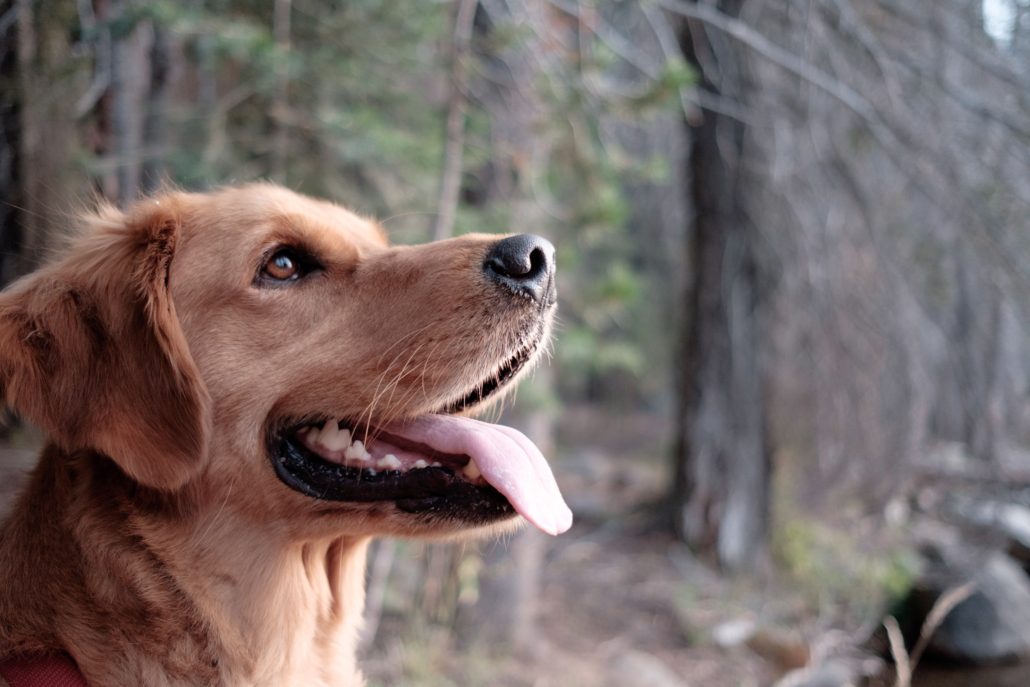Hemp Oil vs CBD Oil for Dogs
Whether it’s for dogs, humans, or other mammals, both hemp and CBD have grown in popularity since the hemp plant was officially recognized as legal with the 2018 Farm Bill (though hemp had a very, very long history before that date). Yet while CBD is found in hemp, not all hemp oil contains CBD. So, what’s the difference between hemp oil vs CBD oil for dogs?
The cannabinoid CBD is found in hemp, so the two are related. Thus, the confusion is understandable. But, they are also very different, not only in labeling and language but in effects and how they’re used.

What Is Hemp Oil for Dogs?
Hemp is another name for a specific type of Cannabis sativa plant. The hemp plant shouldn’t be confused with another strain of the cannabis plant, i.e., marijuana. But for many years, that was often the case. This is why hemp’s legal status remained murky in the U.S., despite the fact that hemp was grown in many other parts of the world, including our neighbors to the North (i.e., Canada).
When the cannabis plant is grown to produce high amounts of THC (tetrahydrocannabinol) content, it’s often referred to as marijuana. THC is the compound that produces the well-known psychoactive high, along with many potential health benefits for humans like relief from pain, nausea, and sleeplessness. (It’s important to note that THC is not recommended for dogs or cats.)
Hemp cannabis, on the other hand, contains only trace amounts of THC (no more than 0.3%), so it lacks the ability to get you (or your dog) high or “stoned.” Hemp should in no way be confused with “drugs” used for recreational purposes.
Hemp seed oil is made by cold-pressing the cleaned seeds from these low-THC strains of the cannabis plant. The oil can then be used nutritionally as it provides high levels of omega-3 and omega-6 essentially fatty acids. It’s especially rich in gamma linolenic acid (GLA), a type of omega-6 that’s been shown to help resolve cellular stress. 1 The seeds also are rich in protein and amino acids and provide high amounts of antioxidants and vitamins like B and D. However, because hemp seed oil is extracted from the seeds of the cannabis plant—rather than the leaves or flowers—it does not provide any cannabinoids, terpenes, or other compounds.
The hemp seed oil can also be used topically as a massage oil or as a component in skincare products and as a carrier oil for other nutrients. Interestingly, there is research on the health benefits of nutrients found in hemp seed oil, such as helping:
- Support healthy levels of inflammation
- Decrease pain
- Reduce symptoms of anxiety 2
- As an anti-acne agent 3
- Ease symptoms of skin issues like eczema and psoriasis 4, 5
- Relieve symptoms of PMS and menopause 6, 7
Hemp seed oil is included in foods, as supplements, and in skincare products. Unfortunately, there’s little in the way of animal, including dog, research at this time.
Hemp Oil vs CBD Oil for Dogs: What’s the Difference?
CBD oil is also made from the Cannabis sativa plant or “industrial hemp.” However, unlike hemp oil, CBD is a component found in strains of hemp that are specifically extracted through various methods from the leaves and flowers of the cannabis plant.
Therefore, broad-spectrum CBD oils provide the beneficial cannabinoids, terpenes, and other compounds from the plant and interact with the body’s endocannabinoid system to produce positive results in the body. CBDs have been shown in research to support:
- Skin health
- Joint health
- Digestion
- Sleep
- Appetite
- Mood
- Behavior
There is specific research that shows that quality CBD oils are both safe and effective for dogs. 8, 9 For instance, CBD oil is popular with pet owners to help manage inflammation, to calm anxiety, to improve the health of the skin, coat, and joints, to help ease allergies, and to decrease pain.
Many pet parents are seeking solutions from CBD because drugs designed to help with these types of conditions often also come with dangerous or uncomfortable side effects.
CBD not only lacks these worrisome side effects, again, it does not lead to any “high” as it is also extracted from the hemp plant, which contains no more than trace (0.3% or less) amounts of THC.
What’s Right for Your Dog: Hemp Oil vs CBD Oil
While both hemp seed oil and CBD come from the cannabis plant, they have very different benefits. If you are looking to support your dog nutritionally and ensure they’re getting enough essential fatty acids, then hemp oil might be the right supplement. Long-term research has found that essential fatty acids may help reduce the risk of heart disease, improve joint lubrication and decrease pain, and help support general health.
On the other hand, the other popular oil from the cannabis plant—CBD—appears to offer greater benefits if you are looking to help your dog deal with health issues, such as:
- Pain and inflammation from arthritis and other conditions
- Anxiety from separation, car rides, hyperactivity, etc.
- Acute stress
- Nervous behavior
- Reduced appetite
- And other acute or chronic issues
So, while both hemp oil and CBD oil from the cannabis plant offer health benefits for your dog, CBD provides a wider range of benefits, including relaxation, mobility, comfort, and greater pain relief without the side effects that often come with drugs.
Hemp Oil + CBD Oil: A Winning Combination
If you’re looking for the best of all words, consider searching for a CBD oil that uses hemp oil as a carrier, which then provides the benefits of both hemp oil and CBD oil, so you don’t have to pick one or the other. For example, ABSC Organics uses both CBD and certified hemp seed oil for the highest quality, premium tincture.
The cannabis plant has so many benefits to offer, and the research is only now showing us the benefits of hemp, CBD, terpenes, and other intriguing compounds found in this ancient but often misunderstood plant.
Related Information:
- CBD Oil for Small Dogs
- CBD Oil for Medium Pets
- CBD Oil for Large Dogs
- CBD Oil for Dogs
- CBD FAQs for Pets
- Pure CBD Oil Dosage for Dogs
References:
1. Fan YY, Chapkin RS. Importance of dietary γ-linolenic acid in human health and nutrition. The Journal of Nutrition. 1998 Sep 1;128(9):1411-4. https://academic.oup.com/jn/article/128/9/1411/4722487
2. Kiecolt-Glaser JK, Belury MA, Andridge R, Malarkey WB, Glaser R. Omega-3 supplementation lowers inflammation and anxiety in medical students: a randomized controlled trial. Brain, Behavior, and Immunity. 2011 Nov 1;25(8):1725-34. https://www.ncbi.nlm.nih.gov/pmc/articles/PMC3191260/
3. Oláh A, Tóth BI, Borbíró I, Sugawara K, Szöllõsi AG, Czifra G, Pál B, Ambrus L, Kloepper J, Camera E, Ludovici M. Cannabidiol exerts sebostatic and antiinflammatory effects on human sebocytes. The Journal of Clinical Investigation. 2014 Sep 2;124(9):3713-24. https://www.ncbi.nlm.nih.gov/pmc/articles/PMC4151231/
4. Callaway J, Schwab U, Harvima I, Halonen P, Mykkänen O, Hyvönen P, Järvinen T. Efficacy of dietary hempseed oil in patients with atopic dermatitis. Journal of Dermatological Treatment. 2005 Apr 1;16(2):87-94. https://pubmed.ncbi.nlm.nih.gov/16019622/
5. Millsop JW, Bhatia BK, Debbaneh M, Koo J, Liao W. Diet and psoriasis, part III: role of nutritional supplements. Journal of the American Academy of Dermatology. 2014 Sep 1;71(3):561-9. https://www.ncbi.nlm.nih.gov/pmc/articles/PMC4134971/
6. Rocha Filho EA, Lima JC, Pinho Neto JS, Montarroyos U. Essential fatty acids for premenstrual syndrome and their effect on prolactin and total cholesterol levels: a randomized, double blind, placebo-controlled study. Reproductive Health. 2011 Dec;8(1):1-9. https://www.ncbi.nlm.nih.gov/pmc/articles/PMC3033240/
7. Saberivand A, Karimi I, Becker LA, Moghaddam A, Azizi-Mahmoodjigh S, Yousefi M, Zavareh S. The effects of Cannabis sativa L. seed (hempseed) in the ovariectomized rat model of menopause. Methods Find Exp Clin Pharmacol. 2010 Sep 1;32(7):467-73. https://pubmed.ncbi.nlm.nih.gov/21069097/
8. McGrath S, Bartner LR, Rao S, Kogan LR, Hellyer PW. A report of adverse effects associated with the administration of cannabidiol in healthy dogs. Vet Med. 2018;1:6-8. https://www.ahvma.org/wp-content/uploads/AHVMA-2018-V52-CannabisAdverseEffects.pdf
9. McGrath S, Bartner LR, Rao S, Packer RA, Gustafson DL. Randomized blinded controlled clinical trial to assess the effect of oral cannabidiol administration in addition to conventional antiepileptic treatment on seizure frequency in dogs with intractable idiopathic epilepsy. Journal of the American Veterinary Medical Association. 2019 Jun 1;254(11):1301-8. https://pubmed.ncbi.nlm.nih.gov/31067185/



